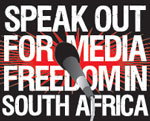






I seem to recall also that some in the media - especially papers owned by Independent Newspapers - got into the spirit of what the government called "reconstruction and development" and made an effort to look for stories of nation-building. It was all quite unprecedented but they were also unprecedented times.
We all settled down to normal as the urbane Thabo Mbeki became president but half way through his second term, it was clear he was become increasingly isolated, paranoid and authoritarian. So it was inevitable that Jacob Zuma would unseat Mbeki.
Mired in controversy long before
Zuma was mired in controversy long before he became president but when he got the top job in April 2009, most of the media took a step back and realised that its judgement might have been clouded by the bitter power struggle between Mbeki and Zuma. When Zuma took office, editorials and opinion pieces across the land took a conciliatory tone and said - not unlike Uys had done in 1994 - let's give the new guy a break.
And, oh dear, what a disappointment. It's clear that the skilful party politician is a weak president, compromised possibly by the fact that he owes so many so much for helping him to win the battle against Mbeki and by his extravagant personal life. To top it all, the man is a cad and supporting his vast polygamous family has made him financially behoven to shady characters such as his former financial advisor, Schabir Shaik, who was convicted of corruption a few years back.

Now Zuma has, rather meanly, forgotten that he benefitted hugely in his rise to power by having advantageous information leaked to the media (remember the intelligence services' phone-tapping scandal) and has attacked the media on many scores (my thoughts in parenthesis below -if you suffer from Big-Man-of-Africa syndrome, look away now):
Media should account to
Because of all of this, says Zuma - and many in the ANC and SACP - the media should account to a state-appointed media appeals tribunal and then there's the Protection of Information Bill that will allow the state to classify pretty much any information it wants.
The ANC would have us believe their intentions are only good - and at least one independent analyst, Steven Friedman, has questioned if we are making too much of the POI Bill - but then there's Mpumalanga.

After the bizarre jackboot detention of Sunday Times investigative reporter Mzilikazi Wa Afrika in August 2010 (because he received a fax purporting to be the resignation letter of Mpumalanga premier David Mabuza), I interviewed a number of Nelspruit-based journalists from a range of news organisations. I reasoned that Wa Afrika - who is from Mpumalanga but is now based in Johannesburg - is protected somewhat by the might of the Sunday Times and I wanted to find out what it was like for the guys in Nelspruit.
I was shocked - absolutely shocked - to discover that the intimidation of journalists is rife in Mpumalanga. Reporters and their sources getting death threats, lone gunmen at night, hit lists, apparent political assassinations - this is all going on a mere four hours' drive from Johannesburg.
And the top guys at Luthuli House are well aware of it, as the party promised it would investigate the situation many months ago, though the promised report-back to the public by the end of July has not materialised.
I have become convinced that Wa Afrika's arrest had nothing to do with his reporting on national police commissioner Bheki Cele but rather his investigations into the alarmingly violent politics of Mpumalanga - with the wealthy and powerful Mabuza at its centre.
I learned from talking to the Nelspruit-based journalists that this kind of intimidation is not new to Mpumalanga. Maybe it has something to do with the fact that the brutal Mozambican civil war was waged in parts of Mpumalanga, said some reporters, but scratch the surface and the violence is there. From as early as about 1994, an intolerance of critical journalism was evident in the political leaders, they say, and then it filtered through to the province's public service.

You can just imagine how the Mpumalanga's politicians must boast to their higher-ups in Pretoria and Johannesburg about how they deal with journalists. "Just send someone to grab the guy on the street and tell him: "Be careful. There are people are watching you," they must advise. And this, in a more elaborate form, is what happened to Wa Afrika.
The difference, of course, is that Wa Afrika's employers are the Sunday Times, which kicked up a huge fuss nationally and had the money to send in the lawyers to get him out of jail.
I think the outrageous and unconstitutional intimidation of journalists and whistleblowers is thriving in Mpumalanga because there is no big daily broadsheet in the province with the gumption or resources to expose and campaign against corruption and maladministration on a sustained basis and take threats to its ability to report freely and fairly to higher level - for example, to the South African National Editors' Forum.
The Eastern Cape - like Mpumalanga - is wracked with endemic corruption but the politicians there know better than to threaten journalists. The Avusa-owned Daily Dispatch and The Herald broadsheet newspapers wouldn't stand for it.
So where does this leave our young democracy?
In unprecedented times once again and they call for unprecedented action: The ANC, the party of the liberation struggle, is quite clearly determined to play the man, not the ball, in its relationship with the media. I used to think that it was principally up to the media to safeguard and fight for the freedom of expression but now I believe that we - the citizens of South Africa - need to do more. If we care about this country's future, we need to demand more of our media - our newspapers, radio and TV stations.
We need to demand that our SABC radio stations do proper news [it is supposed to be our national broadcaster after all, not a state broadcaster - managing ed].
Phone up that station and say: "How can you run a bulletin saying only that Coega has turned the corner and has attracted a host of new tenants? Who are these tenants? Does it justify taxpayers' spending billions or rands on the port? What about the connection to the arms deal?"
Phone up your local newspaper and say: "I think you need to cover the local council better. How many staff have you got covering the municipality and the provincial government?"
Concerned about the pot holes in the roads in your area that never get fixed? Why not get together with other businesses and sponsor a "civic-journalism" page in your newspaper, aimed at highlighting what needs to change in your community and bringing it to the attention of the authorities?
Or phone them up and say: "The municipality is getting more money because of the recent rates hike. I want to know where all the money is going to? Can I help by making a Promotion of Access to Information Act application?"
We can see from what's being going on in Mpumalanga that the ANC's growing intolerance with critical journalism goes back to before Zuma's ascendancy. Zuma will not be president forever but our hard-won freedom of expression will still be under attack by the ANC-controlled state.
We all need to keep watch, to be wary and keep demanding that we have a right to know what's going on.
For more:

